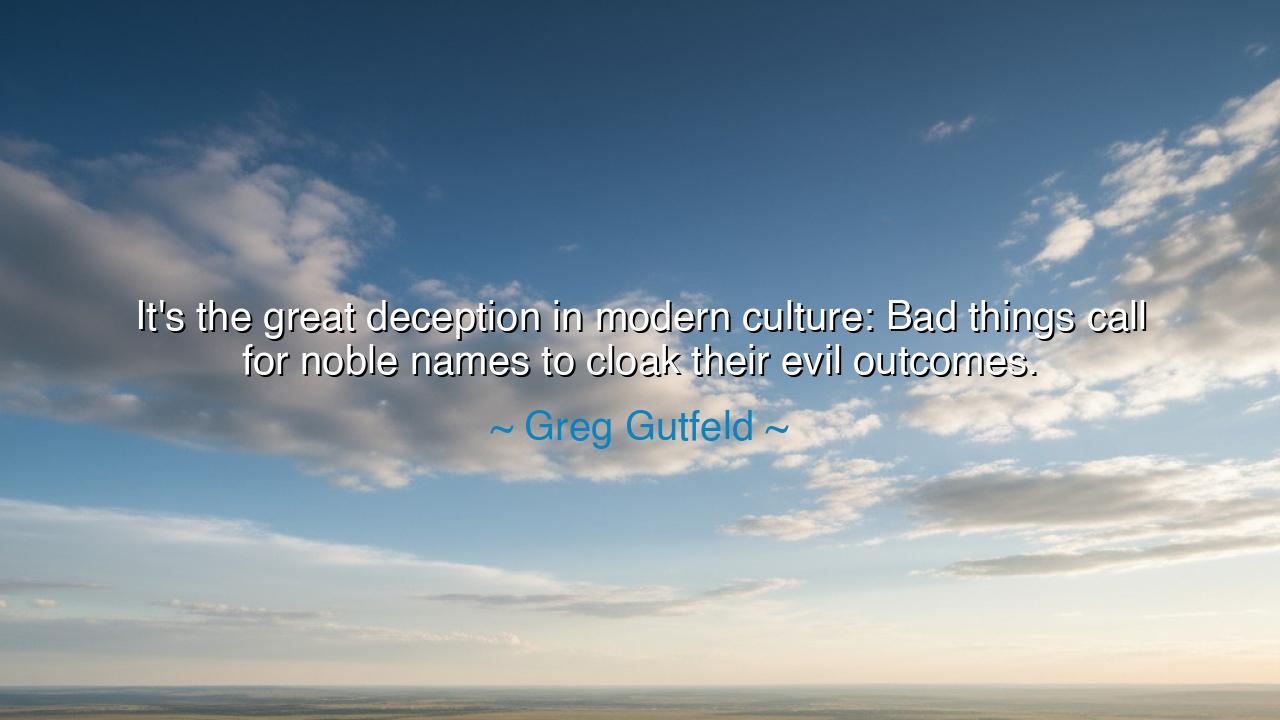
It's the great deception in modern culture: Bad things call for
It's the great deception in modern culture: Bad things call for noble names to cloak their evil outcomes.






When Greg Gutfeld declared, “It’s the great deception in modern culture: Bad things call for noble names to cloak their evil outcomes,” he struck at one of the oldest and most dangerous truths in human history — the power of words to disguise corruption beneath virtue. In this single sentence lies a mirror to every age, for throughout time men have wrapped selfishness in the garments of righteousness, and clothed cruelty in the language of justice. The poet and the philosopher alike have warned us: evil rarely announces itself with horns and smoke; it comes smiling, draped in the banners of good intentions.
The meaning of Gutfeld’s words reaches beyond the politics of his time into the very heart of human nature. For the deceiver’s greatest weapon is not the sword, but the word. A tyrant does not say, “I will enslave you,” but “I will protect you.” A corrupt movement does not cry, “We shall destroy,” but “We shall uplift.” Thus does language become the mask of moral decay. In the modern world, as in the ancient, there are endless examples of this — where causes that promise liberation bring bondage, where policies that claim compassion yield dependence, where unity is preached but division is sown. The noble name is the bait, and the evil outcome the hook concealed beneath it.
The ancients knew this truth well. In the days of Rome, the emperors spoke often of pax Romana — “the peace of Rome.” But this peace was maintained by conquest, by the crushing of nations under the weight of empire. The same word that comforted Roman citizens was a curse to those who lay beneath its banner. The name was noble; the outcome, terrible. So too in every generation, there are those who cloak domination in the language of order, greed in the language of equality, and vengeance in the language of justice. It is the same deception Gutfeld warns of — a serpent with a tongue of honey.
Consider also the story of the French Revolution, born under the banner of Liberté, Égalité, Fraternité — freedom, equality, brotherhood. These were words of light, and for a time, they illuminated Europe. Yet within a few years, they were twisted into terror; the guillotine became the new altar, and blood was offered in the name of liberty itself. It is a lesson carved in the annals of mankind: when men worship ideas without virtue, their ideals become idols. Good names without good hearts breed evil deeds.
The origin of Gutfeld’s observation lies in the decay of truth in modern discourse — a time when speech is weaponized, when labels replace thinking, and moral camouflage conceals intent. We live, as he implies, in an age of rebranding evil. Brutality is called “strength,” censorship is called “safety,” moral cowardice is called “tolerance.” Yet this is not new; it is the same pattern that has echoed through history, now wearing digital clothes and speaking through glowing screens. What makes it dangerous is not only the deceit itself, but the comfort it offers — for once a lie sounds noble, people defend it as though it were good.
And so, the wise must learn the discipline of discernment. Do not be seduced by grand words or shining slogans. Test every promise not by its name, but by its fruit. Ask always: what is the outcome of this idea, this policy, this passion? Does it heal, or does it wound? Does it free, or does it enslave? For the truly noble does not need disguise. Truth walks bare, unadorned and fearless. It is only the false that requires ornament and pretense.
Thus, my child, take this as your lesson: guard your mind from the enchantment of noble-sounding lies. The world will always whisper that darkness is light, that control is compassion, that surrender is progress. But you must be as the watchman at the gate — eyes open, heart steady. Study history, for the same disguises return with new names in every age. Speak plainly, act justly, and see clearly. Let your virtue be measured not by what it is called, but by what it creates.
For in the end, truth does not need the cloak of nobility, and goodness does not need the approval of the crowd. When falsehood comes wearing the robes of virtue, strip them away and behold its form. This is the wisdom of Gutfeld’s warning: that in every age, the greatest deception is not that evil exists — but that it pretends to be good. And only those who love truth more than comfort will ever see through the disguise.






AAdministratorAdministrator
Welcome, honored guests. Please leave a comment, we will respond soon